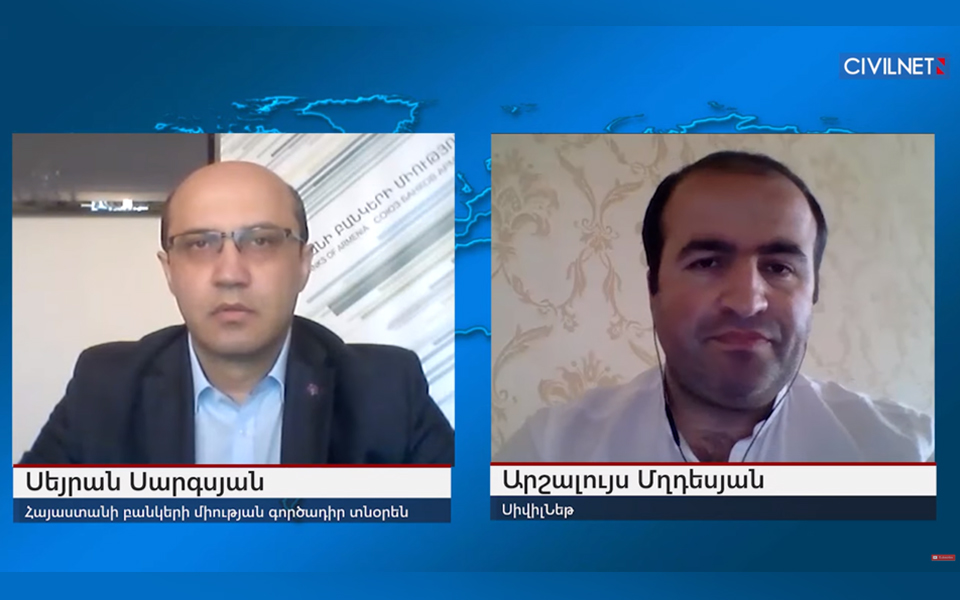Union of Banks of Armenia
Interview of Civilnet with the Executive Director of the Union of Banks of Armenia

Mr. Sargsyan, please evaluate the work of the banking system in the conditions of the economic crisis caused by the coronavirus.
First of all, thank you for the interview.
When, in March, we had a rapid change in the situation in the country- social-economic rearrangements, in my assessment, the initial reaction of the banking system to the situation was quick, adequate and professional.
In addition, I’ll say that, current developments show that we "met" these shocks much better and stronger, on a firmer ground than the global economic crisis of 2008-2009.
I’ll try to substantiate my assessment
During this time, our banks have managed to ensure the continuity of services and uninterrupted work.
We’d kindly note in here, that the banking system has more than 3 million customers and 12,000 employees. As for the customers, we should consider of course, that the same customers may have banking accounts in more than one bank and they are accounted in this number as well. However, the number of customers is indeed significant.
Due to the fact that banks have been investing in new technologies for many years, they were ready to provide all services remotely on digital platforms, and to make customer service in the branches as safe as possible for both bank employees and customers.
Here, I must emphasize the role of customers, as well, that most of them were "willing, able and even continue to conduct their banking transactions remotely or through digital tools, preferring non-cash transactions. It is worth noting that non-cash transactions have been increased in volume and number for several times during this time-period.
During this time there were also difficult moments because of the anxiety of some customers. Some of them terminated their deposit contracts, converted their financial means into another currency. However, this situation has been overcome either, as banks have sufficient cash or highly liquid assets, in other words, sufficient capacity to fully carry out all transactions of all customers.
In this respect, let’s note that these same customers tend to realize the opposite operations nowadays: they re-conclude deposit contracts, re-converted their financial means etc.
Does it mean that the shock has passed away?
I would say that in this regard they have passed over the shock and anxiety they previously had.
Thus, the banks not only overcome the difficulties they face today, but also, within the boundaries of their capabilities and competencies, support their customers to overcome this difficult time period together. I guess you know, that they showed and continue to show individual approach to their customers to help them coming out of this difficult situation allowing them to delay their repayments.
The banks also actively show their contribution to the government in implementing the initiated programs and measures in an operative and efficient manner, bringing the relevant funds to our citizens and businesses.
Regarding to this issue, I would like to say that we all understand that in case of some possible scenarios on the development of this situation, the "pressure" on banks may increase in a number of directions. But at the same time, it will be wise to state that commercial banks definitely manage their risks and strategical planning to balance and neutralize deep risks as much as possible and provide the necessary quality and volume of services to the public.
Mr. Sargsyan, you mentioned that risks and "pressure" for banks may increase in case of some possible scenarios. What might be these scenarios to make these risks appear in the current situation?
I mean the scenarios regarding the development of the current situation: how long will it last? How will it affect the enterprises? How will the customers’ creditworthiness be changed and many other factors? In accordance with these, the possible pressure on banks might be increased or weakened. And in order to accurately handle with these possible scenarios, relevant studies are carried out correspondingly.
Are these studies realized by you or by the Central Bank of Armenia?
They are realized by both-regulating body-CBA and banks-particularly banks risk management departments. They deeply realize analysis and predictions on all the possible scenarios.
What are the main factors influencing Armenia's financial system to stay firm/sustainable these days? Furthermore, new resources of USD dollar are attracted from the financial market, though there was a time of pressure and the rate of USD dollar has picked up to 500 AMD and more? In other words, why it doesn’t happen to appear the scenario of 2014?
We’ve always announced that our system is rather firm and sustainable able to meet various challenges.
One part of the factors affecting the sustainability is under the competency of the Central Bank of Armenia, and the other part-under the commercial banks. One of the key factors in my point is the regulation which could be described as advanced and competitive. Surely, we can state that a number of standards of our banking system are stricter than in a number of other countries.
Under regular conditions, of course, this is an additional burden and expenses for the system, but on the other hand, it provides stability and increases the ability to withstand shocks particularly in the conditions alike. In this respect, the standards for capital and liquidity are especially significant.
Particularly the normatives, directed to the capital and liquidity are essential. Whereas the criteria for the normatives connected with Basel 3 principles have started to become stricter just recently all around the world trying to correspond the banking indices to these normatives, for us, I would say that these criteria are much higher and stricter for already a long ago. I’d emphasize once more that this is a very important factor in providing sustainability.
Besides all of what was said above, we must also emphasize that the Central Bank of Armenia realizes sufficient activity in ensuring the stabilization of macroeconomic environment and the regulation of financial sector.
The next key factor due to which our system is stable, is the high level of professionalism of banking activity, in particular, risk management. Whereas, decision-making, service-providing, long-term planning and rapid-response institutes at financial markets are at high level of their professional development either.
I think, these are the main reasons that make our system competitive both in the region and, I would dare to say, in the world.
As regards to the USD exchange rate: in our neighbor country Georgia, we are in the same region and have some similarities in respect of the economies, but the USD exchange rate in Georgia underwent rapid fluctuations in comparison with Armenia. Moreover, in Armenia it is already on its way of being stabilized.
Here is the question. Can we consider that one of the reasons, that people didn’t go to panic in Armenia and didn’t bring out their money from the banks, was that they have nowhere to transform them in accordance with the situation occurred? The possible locations that were thought to be safe for their money previously were in worse conditions nowadays. Hence, they preferred to keep them in here.
Rather interesting question. Let me first state that, in fact, there are some similarities between our economies, Armenian and Georgian. However, I have to underline that the regulations of banking sectors are significantly different, as vary the resistance of the banks. This should be said not only in comparison with Georgian banking sector, but also with Russian, Ukrainian and many other banking sectors too.
The decision of where to keep the money depends on several factors:
Some people make their decisions considering high interest rate, some others-safety etc. In respect of the safety and interest rate I would definitely state that the Armenian banking sector is competitive. I think our customers (we have a number of non-resident customers, that prefer keeping their financial means in Armenian banking sector), that prefer to keep their money at our banks, they make a right choice.
As for the interest rate, I would say that in recent years, the macroeconomic background in Armenia has been significantly stable, and the banking activities are highly motivated in decision-making with great readiness and responsibility. All this surely has its positive effect on the exchange rate.
However, each time the factors that affect the fluctuations of exchange rate are different.
I guess, we all know what were the factors for this time, but considering the size and length of each factor affecting these fluctuations the exchange rate might change.
Today, we cannot predict the future exchange rate for Armenian dram, as it depends on the possible scenario of the development of the situation.
However, the banking system is ready to implement operational management solutions.
At the point, studies are carried out, possible development scenarios are implemented in order to be maximum ready to face the possible situations.
Mr. Sargsyan, when you mentioned about the sustainability of the Armenian banking sector, that the criteria of Basel 3 are kept accordingly, these principles have been applied for already a long time. However, may economists persist that the Central Bank of Armenia should first of all provide additional liquidity to banks to ensure stability of the financial market, meanwhile cancelling the processes of applying Basel 3 criteria for now making the banks more stress-resistant?
I think that all the measures taken for ensuring liquidity and sustainability, should have been initiated before the appearance of such stressful situations. Otherwise they will be late measures.
I would like to emphasize once more that we have a real sustainable Banking sector, with rather liquid Banks. Maybe I am over-repeating this sentence, but this is rather important message for public. In the situations alike the resistance of banking sector is derived from the beforehand well schemed and professionally organized actions. Coming back to the question, our Banks have quite enough free or highly liquid assets/means for providing uninterrupted transactions to their customers. Moreover, they continue to provide active lending as well.
The Central Bank of Armenia gave its response to the problem at the Right time: a number of regulations were reviewed for giving a prior opportunity to Banks to meet their customers’ needs to defer credit payments.
In addition, the Central Bank of RA is in daily contact with banks. It was particularly announced that, if necessary, an operative response will be provided in accordance with the situation urged.
Banks provide credit leave to borrowers who are currently suffering form heavy losses. There are numerous announcements either that the loan repayments for those months should be canceled/forgiven. It is rather stated that the suffer/losses should be equal to all. What will be your response to these announcements?
It is impossible to show the same approach to all. The matter is different with each citizen and each entrepreneur. If an entrepreneur can continue making corresponding payments to banks, let them do so. But if the consumers have difficulties driven from the current situation, we offer them to postpone the repayments. Here is the necessary response to our consumers for today. We give a chance to them to overcome these difficulties. The next steps depend on the situation either, as it was earlier: firstly, the delay was defined for a month, then a majority of banks announced more delay for two or even more months. For example, for physical persons there were banks to announce up to 6 month of delay for repayments. Depending on the situation the response is adequate.
The banks cannot “forgive the loans”, as credit products are essentially made up of financial resources belonging to the same community, such as bank deposits. We cannot put these resources at danger. This will result in upmost serious consequencies not only for the banking sector but for the whole economy as well.
What do you think, is it right to apply the credit instrument as the means of support by the state in conditions of "corona crisis"? as there is a debate among economists, when the tax tools were also urged by them as the means of combating corona crisis.
I think, the question is mostly directed to the government. However, trying to answer to this question it will be frank to state that the Government's assistance programs to neutralize the problems with the Coronavirus do not only include lending instruments. There are various other support tools available. Also there are already discussed some programs in respect of tax support measures.
However, lending is surely one of the options of support, and it is obviously an effective one, as the demand for the proposed tools show. For example, it is a significant assistance to the business when the latter is provided with financial means on preferential terms and conditions to solve temporarily occurred financial problems.
The government's programs on credit products are aimed at ensuring the short-term stability of employers. The indicators of these programs are defined in a way that these loans will have an impact on possibly ensuring the continuity of the development of certain specific directions by the enterprises, as well as providing employees with salaries.
There was an announcement by the Minister of Finance that at about 2% of economy is expected to decline. Thus corresponding changes were realized in the budget 2020 to introduce to the approval of the General Assembly. According to Minister’s announcement, the significant decline in GDP is expected too for this year. How will these declines affect the banking sector and financial system?
It is clear that this will definitely have its impacts considering the size of decline. When I mentioned above that all the important measures should be taken in order to be well prepared before arising such situations, I meant that financial institutions must be well prepared for the situations alike beforehand in the following manner: in recent years we regularly see that the banks go on in increasing their capital, they are quite liquid, they enough free or highly liquid assets/means for providing uninterrupted transactions to their customers. Such scenarios could never be excluded and the financial institutions should be ready to face them with high proficiency.
And these very issues are considered to be the matters to be studied by the banks risk management departments in order to plan their funds, operations and strategy capable to be maximum ready to overcome the development of such situations.
I can surely state that today these scenarios are correspondingly studied at banks to be ready to face them as needed and help their customers to come out of difficult situations easily. It is very important of course to continue to provide active lending as well, as this provides some entries of financial means to the economy and makes the economy provide its active operation
Besides these support lending programs provided by banks today, do they continue their regular lending as well?
Yes, Banks continue providing lending activity, and they are liquid. However, we should understand that the creditworthiness of consumers and entrepreneurs could be decreased in current situation, and the lending, of course, could be decreased too. But the fact that the banks make lending today, is obvious.




